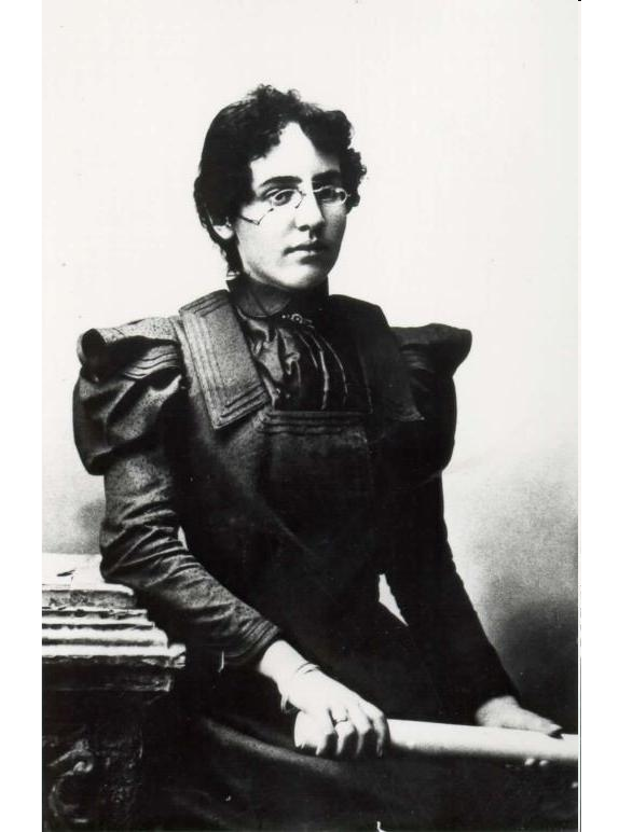WOMAN WRITER OF NOVEMBER
Darko Ilin, M.A. student, University of Nova Gorica
ZOFKA KVEDER (1878-1926)

Zofka Kveder – first Slovenian professional woman writer
Zofka Kveder (1878–1926) significantly contributed to the cultural life in Slovenia, the Austro-Hungarian Empire and the Kingdom of Serbs, Croats and Slovenes. She was the most distinguished Slovenian woman author in the beginning of the 20th century: a journalist, translator and established feminist who actively debated women’s issues. In her prose, which was heavily influenced by her feminist ideas, Kveder depicted gender-based violence within the proletariat as well as more delicate means of restraining women, such as loveless arranged marriages. Addressing topics that were deemed unmentionable at the time, in particular sexuality, and deconstructing the image of a woman as “the angel in the house” were the main reasons for conservative contemporaries not valuing her work. Kveder’s dramatic and prosaic oeuvre is therefore imbued not only with new ideas of women’s empowerment, but also with an immense compassion for the marginalized and an authentic understanding of the zeitgeist. By writing in different languages, portraying the experience of an emancipated woman and by tackling troublesome topics, Zofka Kveder expanded the horizons of Slovene literature and culture while also establishing an identity of the woman writer in the beginning of the XXth century.
In her short story Tuje solze (Someone Else’s Tears) published in 1902, Zofka Kveder reflects upon the position of a woman writer whose work is looked down upon. In this text, she points to the positive impact of emotions as the traditional characteristic of texts written by women. Emotions are a valuable asset to narrative art and she accentuates the value of articulating emotions through literature. Therefore, in this text, Zofka Kveder oultines her fundamental understanding of the importance of narrative empathy.
Zofka Kveder in her own words: Someone Else’s Tears
We were talking about a writer. “I don’t like her,” someone said. She never gives herself, her heart, her soul. Where is she, honestly?! Her eyes are burnt out, there is nothing else within them; she views everything with the eye of a detective, stern and cold; her eyes search and discover. But where is she, where is her soul, where is her heart, where is her laughter, where are her tears? You can’t find them, can’t find them!” And the others agreed: “Yes, it’s true, we can’t find them. She is a real talent, she fought for it, but she lacks courage or has too much pride to give us more than just her talent; she doesn’t give us her soul and her eyes are cold and silent, they are like convent windows in deserted streets. But this is no longer enough, today, when we spill our heart’s blood around, when with painful joy we tear off the last bandages of our souls!” “It is not enough, it is not enough!” they kept saying and some were preparing to say nasty things about this writer, this silent and unapproachable writer. Then my friend spoke up, my friend with dreamy eyes and a profound soul. With a timid and quiet voice she said: “It is not enough?! It is not enough that she walks after us and picks up our tears, that she collects our sighs and captures our rare smiles?! We are ungrateful, ungrateful, all of us.”She blushed, lowered her eyes and didn’t say a single word for the whole afternoon. When I walked home along a dusty road and I got to the hill, tired and sweaty, I turned back and I thought I saw a woman with cold and searching eyes walking at the foot of the hill. She was collecting tears and stored each and every one of them in her heart. And when she got closer, I noticed that tears were dropping of her cold, extinct, searching eyes and falling down on the road. These large, bitter tears are falling from her searching eyes to the road, but she walks on, her feet stepping into her glittering tears and covering them with grey, dirty road dust. She walks on and bends down to the ground and captures every tear someone has dropped and keeps it in her heart.***Zofka Kveder is the only Slovenian Woman Writer presented on the caricature by Hinko Smrekar, Slovenian writers, 1913

Read more about Zofka Kveder
Katja Mihurko Poniž: Ambiguous views on femininity in the writings of two “New Women” in the fin de siècle: Zofka Kveder’s inspirational encounters with Laura Marholm’s modern women. V: MIHURKO PONIŽ, Katja (ur.). Reception of foreign women writers in the Slovenian literary system of the long 19th century. Nova Gorica: University of Nova Gorica Press. 2017, str. 37-71. http://www.ung.si/media/storage/cms/attachments/2017/04/03/14/57/48/HERA.pdf.
A comprehensive comparative analysis reveals the overlooked qualities of the book Modern Women (Das Buch der Frauen, 1894) trying to answer the question why this particular book inspired Zofka Kveder’s feminist collections of short stories Misterij žene (The Mystery of a Woman, 1900). The author of this chapter concludes that the reception of Laura Marholm was as ambivalent as her book, which became evident in the analysis of the reception of another writer, Zofka Kveder herself. The research to now was focused only on the reception in the western part of Europe, which demonstrated a positive reception by the public with traditional views of women, and a negative reception by feminists.